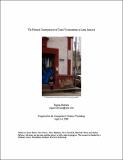|
Reseña:
|
In the last two decades, violent crime rates in Latin America have increased exponentially. Though this is one of the most significant recent developments in the region, the political consequences of Latin America’s violent crime epidemic are largely unknown. Many scholars and commentators imply that the crime wave bodes ill for democracy in the region, suggesting that high levels of violent crime cause disillusionment with government, reduce mass political participation, and increase popular support for authoritarianism and mano dura. This paper evaluates the micro-foundations of that conventional wisdom. Analysis of data from the Latinobarómetro and LAPOP surveys consistently and convincingly shows that recent crime victimization is associated with increased political participation. Rather than becoming disenchanted or disempowered, Latin American crime victims are actually more politically active than comparable citizens who have not been victimized. Crime victimization has a more ambiguous relationship to political opinions. Victims are less satisfied with law enforcement than their non-victimized peers, and they are more likely to be concerned about crime as a public policy issue. Some regressions suggest that victims may have more pro-authoritarian views than their peers and may be more likely to support mano dura and vigilantism, but this result is not consistent across analysis of multiple surveys so the true relationship is difficult to ascertain. |



